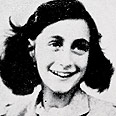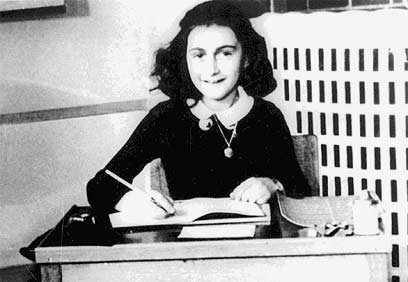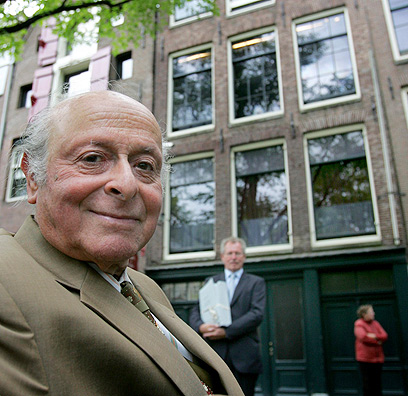
Anne Frank charities clash over archive
Conflict between Switzerland-based, Netherlands-based organizations is in part a struggle to control teen Holocaust victim's legacy. Yet with one side comparing other to Nazi Germany, it also threatens to damage both institutions' reputations
The conflict between the Basel, Switzerland-based Anne Frank Fund and the Amsterdam, Netherlands-based Anne Frank Foundation is in part a struggle to control the late Jewish teen's legacy. But, with one side even comparing the other to Nazi Germany, it also threatens to damage both institutions' reputations.
Video courtesy of jn1.tv
"It's really sad this is happening," Foundation spokeswoman Maatje Mostart said Wednesday.
Anne Frank became a tragic symbol for all Holocaust victims because of the diary she wrote while in hiding from the Nazis with her family from 1942-1944. They were betrayed, caught, and deported, and Anne died in a German concentration camp at age 15. Her father survived the war and published the diary, which went on to become one of the best-selling books in history.
The archive, which contains 25,000 family letters, documents and photos from several generations, has been in the care of the Foundation in Amsterdam since 2007, on a loan from the Fund that it expected would become permanent.
The Fund, headed by Anne Frank's closest living relative, her cousin Buddy Elias, now wants the material to go to a new permanent Frank Family Center devoted to the wider Frank clan and other relatives, not just Anne. It will be located at the Jewish Museum in Frankfurt, Germany, where Anne Frank was born in 1929.

Battle over name, legacy and money Anne Frank (Photo: AP)
Aside from the debate over the loan agreement, the Foundation insists that that not all of the archive even belongs to the Fund. The Foundation is best-known for running the Anne Frank House museum, located in the actual Amsterdam canal-side building where the young girl and her family hid during the German occupation of the Netherlands.
Mostart says the Foundation will return the parts of the archive that belong to the Fund, if the Fund insists. Eventually.
The disagreement had been quietly simmering since 2011, and in July 2012 a Dutch civil court in a provisional ruling rejected the Fund's demand for an immediate return of the archive. Judges found the loan agreement indicated a term of at least 10 years.
'One of millions of Holocaust victims'
Mostart said the Foundation hoped to keep negotiating the issue discreetly. But the matter became known to the public on Wednesday when a member of the Swiss-based Fund's board was quoted in Dutch newspaper De Volkskrant as saying "in the 1940s, the Frank family had its possessions seized by the Germans and their accomplices. Now a Dutch institution is trying again to carry out a seizure."
Reached by telephone in Switzerland, the board member, Yves Kugelmann, confirmed the quote. "It's just a matter of fact," he said.
The disagreement between the two organizations stems in part from decisions made by Anne Frank's father, Otto, who survived the war and died in Switzerland in 1980.
He participated in the establishment of the Anne Frank House, and gave the original copy of Anne's writings to the Dutch state. But Otto left his family estate to the Swiss-based Fund, including, crucially, publishing rights to the diary.

Anne Frank's cousin Buddy Elias (L) poses for portrait as director of Anne Frank Foundation Hans Westra holds some of 25,000 letters, photographs and documents from Frank family archive (Photo: AP)
David Barnouw, a researcher at the Netherlands' Institute for War, Holocaust and Genocide Studies, said Kugelmann's comparison of the Foundation to the Nazis is "not fair." But he added that he didn't know which side is in the right.
He said that the Fund had for many years used proceeds from the diary to fund its charity activities, such as combating anti-Semitism and promoting awareness of the Holocaust, and left the Foundation to focus on Anne's story.
The two organizations collided in the 1990s over fundraising activities by the Foundation. The Foundation's main source of income was from selling tickets to the million-odd visitors the Anne Frank House receives each year, and it was soliciting donations for a major renovation.
The Fund objected to what it saw as the wrong kind of commercialization of Anne Frank's legacy, and attempted to win exclusive rights to Anne Frank's name as a trademark.
But a Swiss court ruled in 1997 that the Foundation could continue to use the name in fundraising.
Barnouw said he was sympathetic to the Fund's desire to build a museum focused on the Frank family. Sometimes the amount of attention given to Anne Frank seems disproportionate, given that she was one of millions of Holocaust victims, he said.
"But," he added, "without Anne Frank, there is no family museum."










